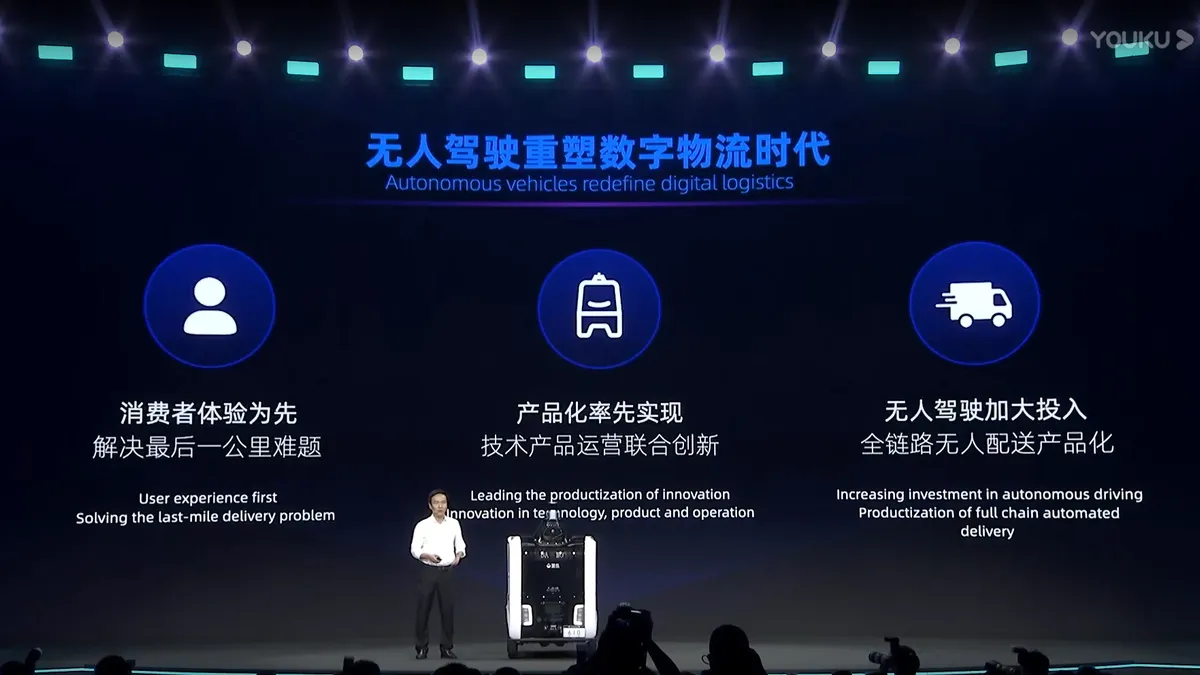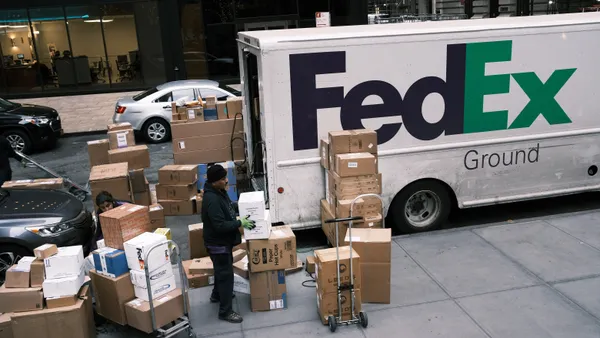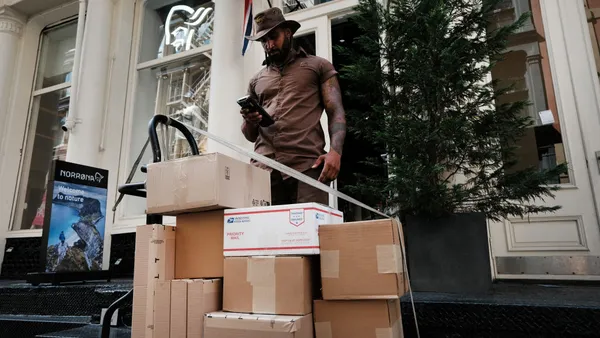Dive Brief:
- Amazon and Alibaba have each unveiled over the last week robots they have been developing at research facilities, and their plans to test or deploy them in warehouses and last-mile delivery, according to separate announcements from the e-commerce companies.
- Alibaba's logistics arm Cainiao Network announced its plans to deploy 1,000 Xiamonanlv robots to universities across China, after having tested the unmanned delivery vehicle at 30 universities over the past year, and finding the robot could deliver 150 packages a day with a 98% customer satisfaction rate.
- Amazon's announcement outlined the various robots it is testing at research labs in Boston and Northern Italy. Its most advanced are two "autonomous guided carts" the company has named Kermit and Scooter, which the company said would be deployed at its facilities later this year.
Dive Insight:
In a keynote address to Cainiao Network's 2021 Global Smart Logistics Summit, Alibaba's Chairman and CEO Daniel Zhang said the pandemic brought about a "great fusion" between e-commerce and logistics, and this trend is spurring investment in the "production tools" and "digital tools" that facilitate delivery.
"We need to look at supply chain logistics not merely from the perspective of logistics, but as a result of digitalization," Zhang said, according to a live translation of the remarks.
E-commerce has been growing steadily for the last two decades, but the pandemic accelerated that growth as traditional models of fulfillment and buying a product in-store became difficult or impossible. In turn, the need for a "flexible" and "optimized" supply chain to meet "consumers' whimsical demands" became ever more prevalent, Zhang said.
As demand for e-commerce has increased, robotics companies have been looking for ways to use technology to make facilities and operations more productive. And one estimate by Prologis says that robotics could improve facility productivity — measured by revenue per square foot — by 10% to 20% in e-commerce real estate over the next three years.
As a logistics company, Zhang said the guiding principle is to deliver "better service at lower cost." It was a principle that reverberated throughout the summit, and in particular as Li Cheng, CTO of both Alibaba and Cainiao, announced Xiaomanlv would be deployed at multiple universities across China.
Announcing a significant milestone for the #logistics robot 'Xiaomanlv' as it get productized with 1,000 launching across #China's universities and communities. This will greatly improve last-mile efficiency as users enjoy fuss-free and accurate deliveries. pic.twitter.com/zQWMXtIsKP
— Cainiao Network (@OfficialCainiao) June 14, 2021
"We want to resolve the last 100-meters delivery," Cheng said. "After half a year of verification, we believe that Xiaomanlv can be connected with our logistic end terminals and we need to put it to use."
It's not just in China where the pandemic is spurring a greater investment in robotics. Orders of industrial robots in North America surged by 20% in the first quarter of 2021, according to the Association for Advancing Automation. And the interest in robotics, while driven by digitalization, is agnostic of the industry. The automotive industry is highly mechanized, but retailers like Circle K and logistics providers like DHL are making big investments as well.
Robot orders tick up during pandemic
Amazon is not falling behind in this investment. Like Alibaba, which tapped its research facility, the DAMO Academy, to help develop the Xiaomnalv robot, Amazon has its own research facilities working on an assortment of technologies that could help make supply chain processes more efficient:
- Ernie is a "workstation system" that uses a robotic arm to take totes off robotic shelves and delivers these to employees, to avoid the need for frequent reaching or bending.
- Bert is an autonomous mobile robot that Amazon hopes can eventually move large heavy items or carts with multiple packages as it works alongside employees around a facility.
- Scooter and Kermit are autonomously guided carts that move products around facilities and potentially avoid collisions.
- An unnamed motion-capture system is also in the early stages of being tested to monitor employees' movements in a way that could make safety recommendations in order to prevent injuries.
Amazon, like Alibaba, is consistently testing and developing robotics in its facilities for broader use. But DHL showed with its years-long pilot with Locus Robotics, it takes a while before a robot proves its ROI in a way that can be deployed network-wide.
Amazon says it so far deployed 350,000 "mobile drive units" at its facilities worldwide. Alibaba did not give a total number at its 2021 Global Logistics Summit, but it claimed the deployment of 100,000 unmanned vehicles at China's universities was the first "large-scale application of autonomous vehicles."














